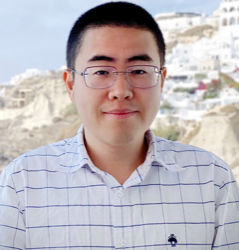Inaugural Data Science Institute Summit Highlights Impact Across and Beyond Campus
At its core, data science is the study of obtaining value from data. Yet despite this simplicity, the emergence of this young field has unleashed a vast array of questions and challenges: practical, theoretical, social, ethical, and more. In its potential for impact, it touches virtually every area of science and scholarship, and stretches beyond research to applications in industry, education, and community empowerment.
The research, education, and outreach activities on display at the inaugural Data Science Institute Summit on May 9th reflected this exciting, field-defining opportunity for the University of Chicago. In announcing new interdisciplinary research efforts, partnerships with colleges, universities, and industry affiliates across the country, and collaboration with social impact organizations around the globe, the Data Science Institute (DSI) demonstrated its value to the “engaged university” envisioned by University President Paul Alivisatos.
“I’m very excited about this institute launching,” Alivisatos said, “and from my vantage point, I see it as at the nexus of what it will mean for the coming years of the university: how it’s going to be a place of great knowledge creation, of phenomenal education, and also a place of helping society to transform itself in positive ways.”
[Watch full video of the summit or a highlights version.]
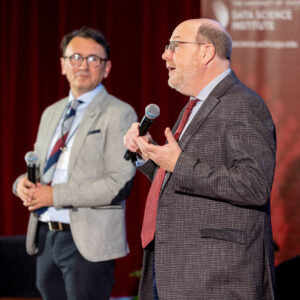
The DSI was founded to realize the unique University of Chicago vision of data science: a holistic approach that goes beyond technical skills to encompass the theoretical foundations of the field, its social and ethical implications, and the application and communication of its innovations.
“Data Science represents a revolution for science and scholarship at large,” said DSI faculty co-director Michael J. Franklin, the Liew Family Chair of Computer Science. “It’s a new way of transforming our most valuable resource, data, into unprecedented discoveries and technologies around the most important challenges in science and society.”
The DSI expands educational offerings at the University of Chicago, creating research collaborations spanning disciplines across campus and new partnerships, including a new national data science education network of minority-serving institutions and an industry affiliates program – both announced for the first time at the summit.
“The DSI will not only continue to define the field of data science, but also aims to build a world leading academic unit to advance data-driven education, discovery and innovation,” said Dan Nicolae, DSI Faculty Co-Director and Chair of Statistics.
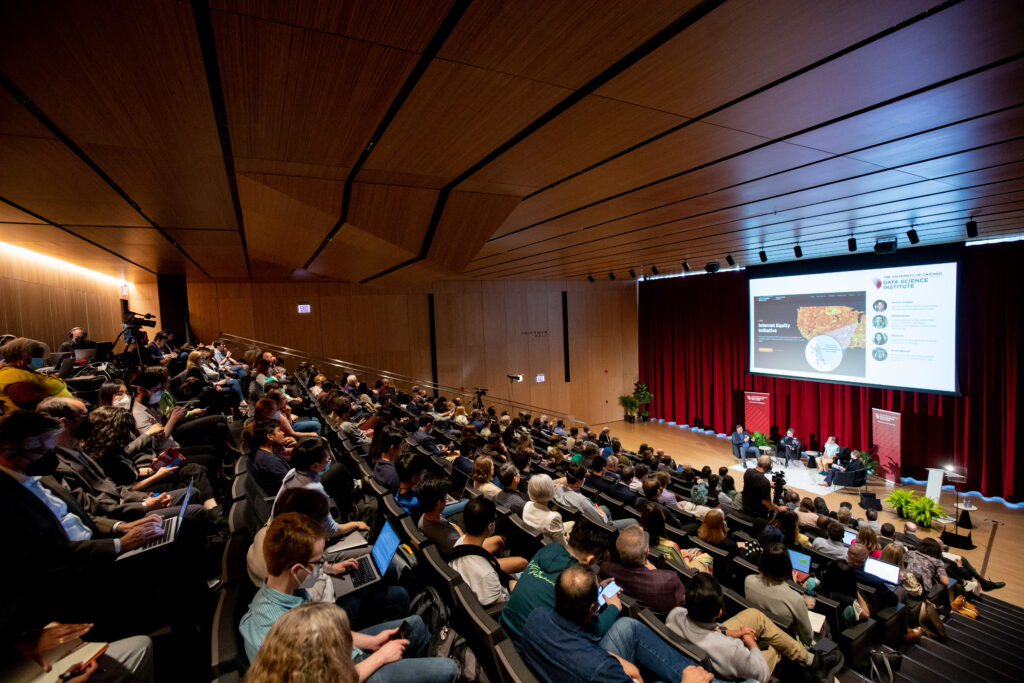
Unlocking Transformative Research
Data science offers a new common language that can connect and expand different fields in exciting new ways, forging multidisciplinary collaborations that comprehensively address complex questions requiring multiple perspectives to solve. The DSI approach to research seizes this opportunity by creating new initiatives that enable these unique and powerful applications, unleashing the potential of data science.
“Data science in isolation will have relatively limited impact,” said Rebecca Willett, DSI Faculty Director of AI & Professor of Statistics and Computer Science. “But the integrative approach that we’re developing here at the University of Chicago, involving top scholars in a number of different fields, is going to be distinctive and world-changing.”
Three DSI research initiatives demonstrated this approach at the summit in panels that articulated their mission and early results. The Internet Equity Initiative, co-led by DSI faculty director of research Nick Feamster and Crown Family School of Social Work, Policy, and Practice Associate Professor Nicole Marwell, unveiled its new data portal, with interactive maps and data stories that dig deeper into the current state of connectivity in Chicago and other American cities. These analyses motivate further research and data collection, in partnership with local community groups, meant to inform and create effective policies that improve Internet infrastructure for all citizens.
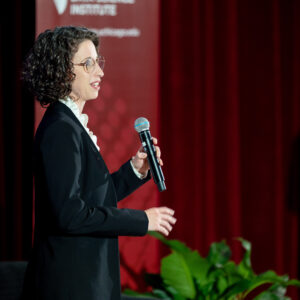
AI+Science integrates the considerable advances of artificial intelligence into the scientific method, simultaneously advancing discovery in the natural and physical sciences and the foundations of these new AI approaches.
“At the Physical Sciences Division, we have computer science and statistics alongside these other fields that are based more on the laboratory work,” said Angela Olinto, Dean of the Physical Sciences Division at the University of Chicago. “Together, we are trying to give a house to all kinds of ways of thinking about data science in the future. So we’re very excited about that.”
The Data & Democracy initiative — a partnership between the DSI and the Center for Effective Government at the Harris School of Public Policy — combines University expertise from computer science, political science, law, and neuroscience to understand politics and government in the digital age.
“This is a big space, where we need help from people who have been thinking long and hard about this digital environment, how to measure it, how to characterize it,” said William Howell, Sydney Stein Professor in American Politics at the University of Chicago. “This is what this university does so well, right? I mean, this is about bridging those divisions across disciplines in a serious way.”
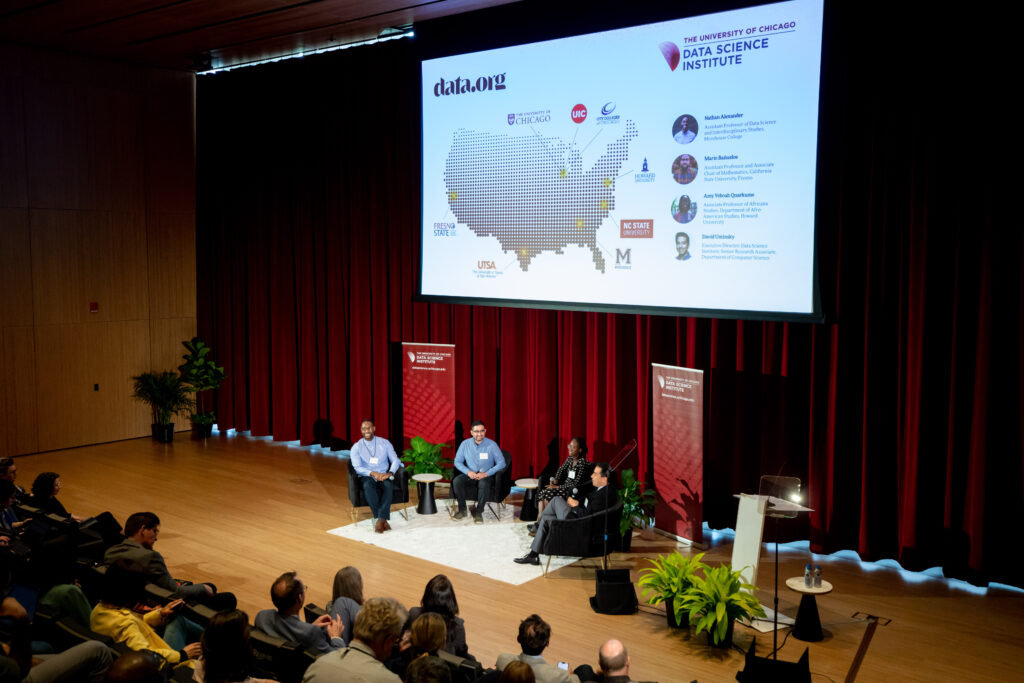
Seeding the Next Generation of Data Scientists
Defining the field of data science means creating a new pipeline for students to become data scientists, starting from an early age and with inclusive practices that make the discipline accessible to people of all backgrounds. Through new programs at the University of Chicago and new partnerships that stretch beyond campus, the Data Science Institute is at the center of this educational opportunity.
“Success for us looks a lot like who is going to be a data scientist graduating from University Chicago or elsewhere in the university system,” said DSI executive director David Uminsky. “We may see a lot of students that may have overlooked a STEM education feeling invited and included in this new effort. If we do that, we’ll be pretty successful.”
At UChicago, the new undergraduate major in data science was designed with that goal in mind. The degree offers several options for students, including tracks dedicated to theory, computation, or a balance of the two, and like the data science minor before it, can be combined with another speciality into a complementary double major.
“I think the data science major and minor is the most important thing that I’ve seen here in 25 years for the undergrads,” said Steve Levitt, William B. Ogden Distinguished Service Professor in Economics and the College. “It’s teaching them a set of skills that are incredibly practical and useful in life and in business. But it’s deeper than that. Because it’s just such an important framework for thinking about the modern world…these are skills that everybody should want to have.”
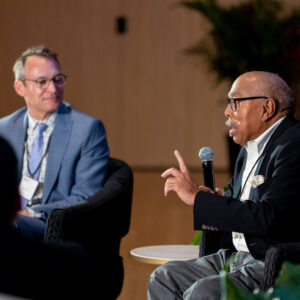
The centerpiece of the data science major is the new Data Science Clinic, an experiential, project-based course where students work on real-world data with partners from academia, government and industry. The clinic was represented at the Data Science Summit by panels on projects with Prudential Financial, the City of Chicago, and Inclusive Development International, a breadth of application that impressed legendary scientist, educator, and business leader Walter Massey.
“There’s an opportunity to use real-life problems in teaching the discipline [of data science],” said Massey, who has served as president of the School of the Art Institute of Chicago and Morehouse College and the director of the National Science Foundation and Argonne National Laboratory. “And I think that other disciplines might learn from what you are doing, as a matter of fact, to improve the quality of teaching.”
Massey participated in the summit as the Trustee Chair of the City Colleges of Chicago, who partnered with the DSI to introduce a new preceptorship program to train college-level educators in data science. A later session introduced a new data science national education network, funded by data.org and led by the DSI, which includes minority-serving institutions Howard University, the University of Illinois Chicago, Morehouse College, Fresno State University, North Carolina State University, The University of Texas at San Antonio, and the City Colleges of Chicago.
Together, representatives from these schools will develop new data science curricula and programs and adapt them to their school’s specific needs, broadening the pipeline for careers in data science and attracting more students through the potential of data science for social impact.
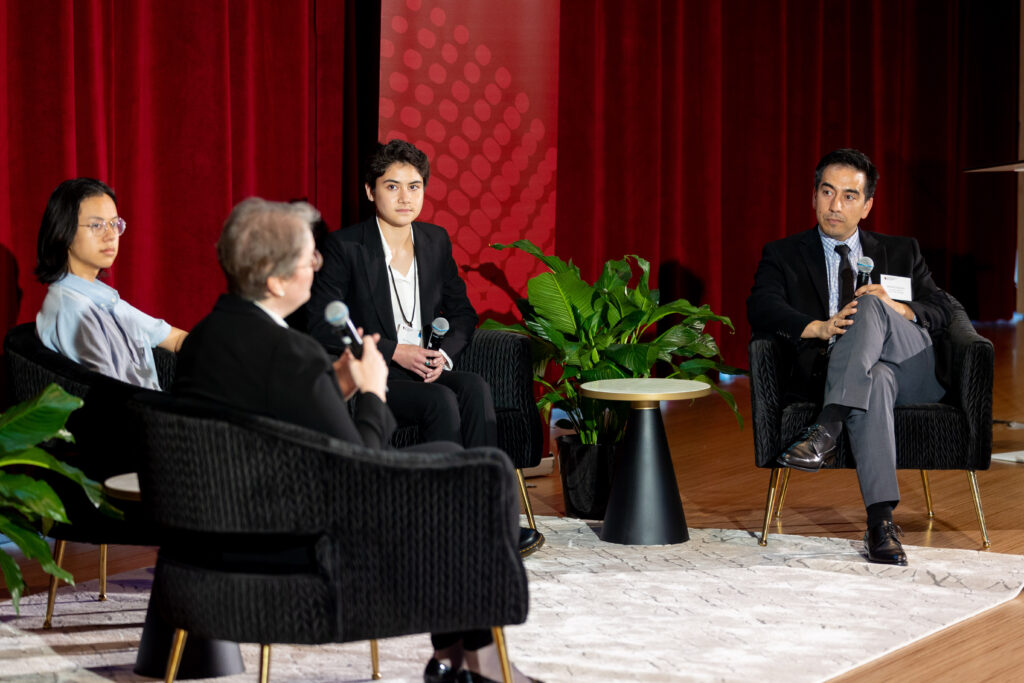
Data Science Impact, Around The World
Alongside the academic partnerships, the DSI is building new connections from the University of Chicago to the global business and non-profit sectors. At the summit, faculty co-director Michael J. Franklin announced the founding members of the DSI Industry Affiliates Program — Prudential, American Family Insurance, Verizon, and DRW — as well as future plans with the Polsky Center for Entrepreneurship and Innovation around accelerating startups in data science and AI.
“Data science is inherently a practical discipline,” Franklin said. “Its roots and many of its key advances began in industry, and high bandwidth dialogue between researchers and practitioners is crucial to its further development.”
The data science clinic panel with Prudential’s Chief Data Officer Kjersten Moody and undergraduate students Alex Hayward and Ethan Croitoru offered one example of how these partnerships can benefit all sides. The combination of technical data science skills and a liberal arts education will produce many more promising graduates, Moody said.
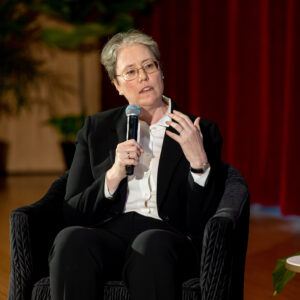
“We have heard over and over today how data science is a multidisciplinary team topic that is going to be integral to solving many of the big problems that we as societies as humans are facing over the foreseeable indefinite future,” Moody said. “And it’s not the mathematical skills or the computational skills that will take a practitioner of data science to the leading edge of that field. It is the interdisciplinary approach and the understanding, the ability to ask questions, the ability to understand from multiple perspectives.”
This powerful combination can also benefit organizations doing social impact work around the globe. As the data science hub for the Schmidt Family Foundation’s 11th Hour Project, the DSI develops tools and organizes clinic projects for non-profits working in energy, food and agriculture, human rights, and marine technology. One such effort, the creation of the DeBIT app for tracking the financing behind development projects, was featured at the summit.
“The idea behind the DSI outreach pillar is that you don’t need to be a large corporation with lots of data scientists or huge datasets to really make use of these tools, said Daniel Grzenda, Staff Data Scientist at the Data Science Institute. “You can find plenty of interesting problems and datasets working with our partners in the nonprofit space, as well as social impact organizations.”
By showcasing these research, education, and outreach programs touching nearly every academic unit on campus, the inaugural summit demonstrated how the DSI has quickly established itself as a key part of the University of Chicago mission, using data science to unlock powerful new combinations of expertise across fields.
“The Data Science Institute will be a remarkable resource for the entire university,” said Ka Yee Lee, Provost of the University of Chicago. “It will help the University of Chicago continue to push the frontier of science and inquiry while confronting the world’s most significant questions and challenges.”
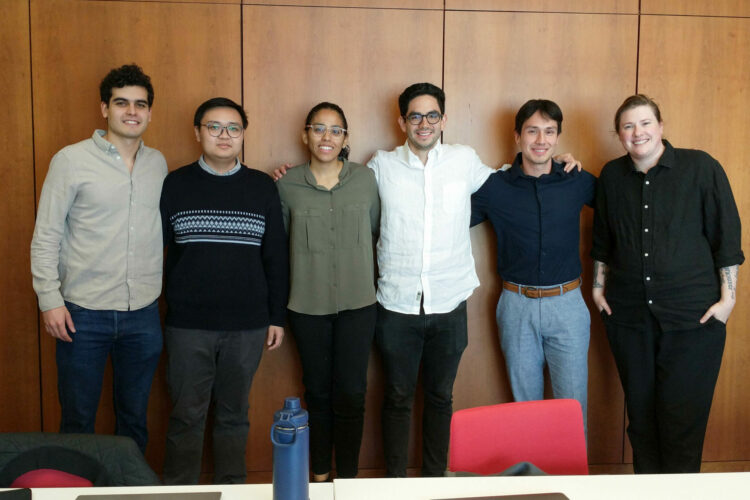
Community Data Fellow Stephania Tello Zamudio helps broaden internet access for Illinois residents
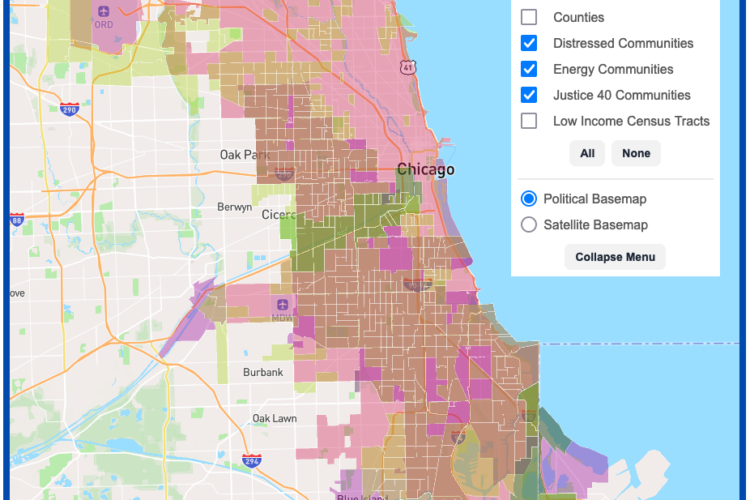
DSI Software Engineers create interactive map tool to maximize climate investment tax benefits
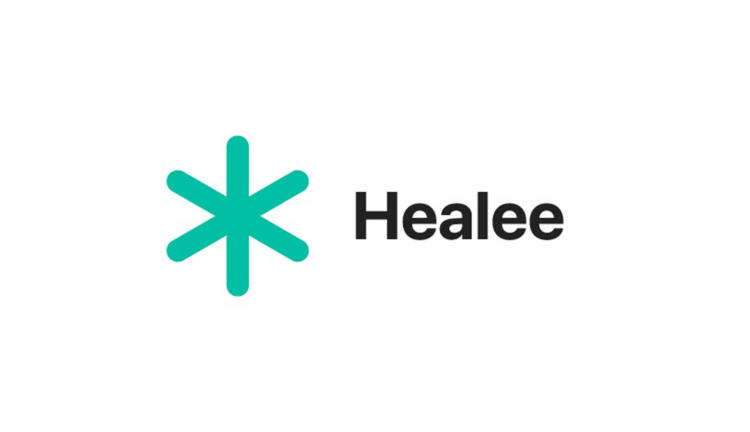
Transform cohort 3 participant Healee uses AI to improve healthcare
